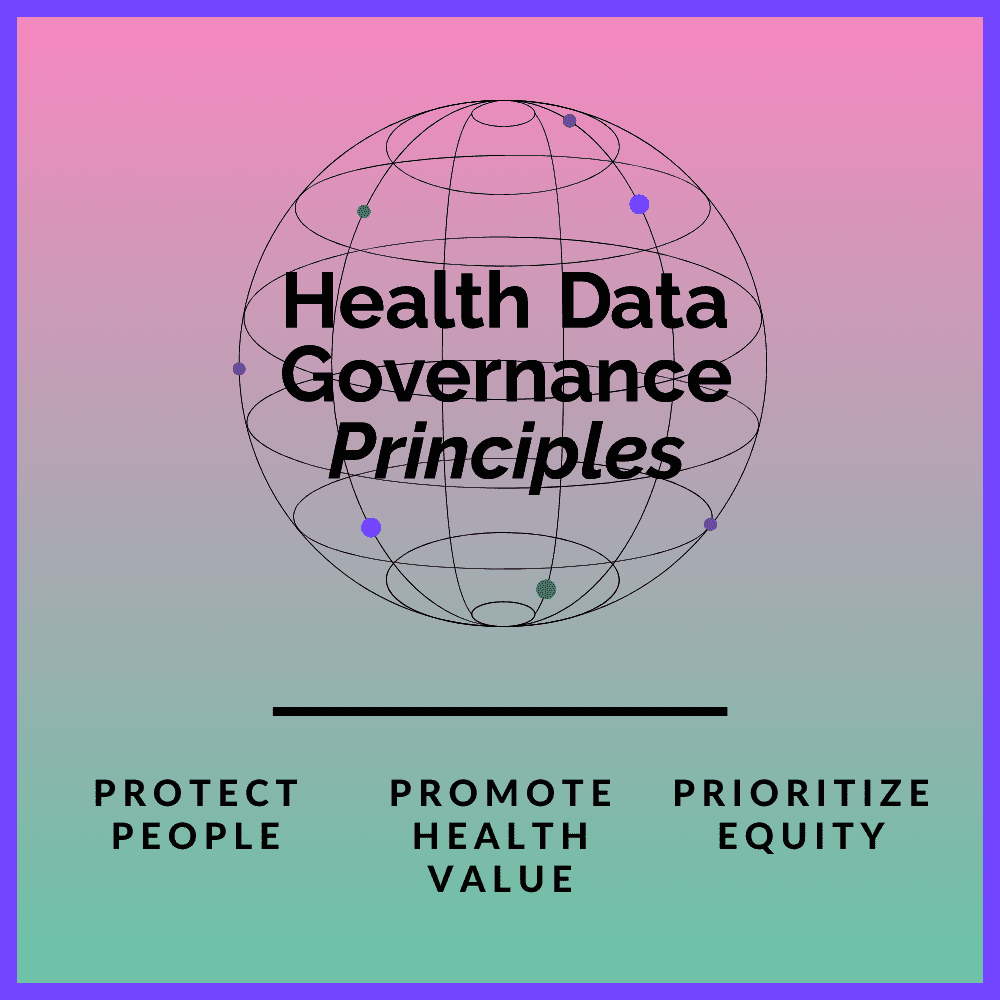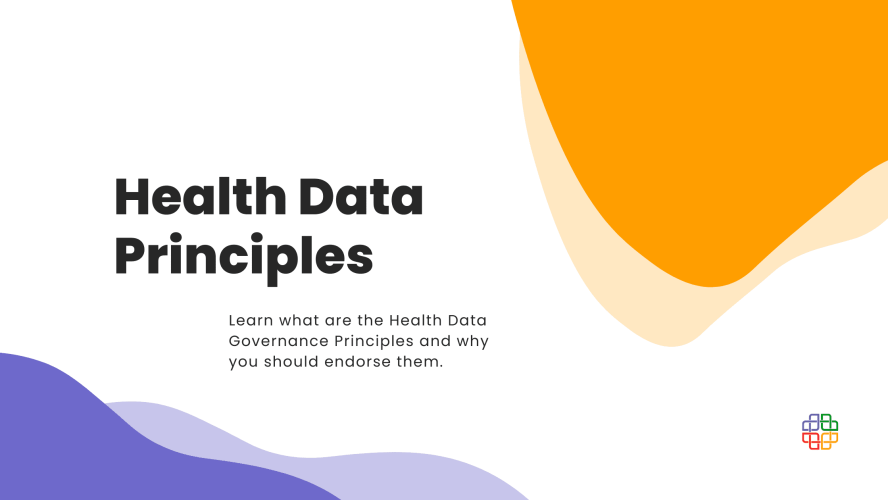Modern world revolves around data. We are collecting, processing and analyzing it. We protect our personal data from being stolen, because it is a powerful source of information. We value our data and let it guide us while making important decisions. Our existence in all kinds of official records is based on data, too. We need data to navigate through the world and through our lives.
One of the most significant types of data is health data. It has a heavy influence on our lives and security. Therefore, it must be governed in a specific way. Until now there was no official universal set of principles to guide the governance of health data across public health systems and policies. To fill that empty spot, The Health Data Governance Principles have been created. In this article we will introduce you to the idea and its benefits, and describe how you can join the movement.
The Health Data Governance Principles
The Health Data Governance Principles were established under the aegis of Transform Health, and funded by Fondation Botnar. Many professionals from the digital health field collaborated on the form of the Principles, including: Asia eHealth Information Network (AeHIN), FIND, Fondation Botnar, the Health Data Collaborative’s Digital and Data Governance Working Group, I-DAIR, IT for Change, Jhpiego, PATH, Philips Foundation / Digital Connected Care Coalition, Red Centroamericana de Informática en Salud (RECAINSA), Tech 4 Health (YET4H), the BID Learning Network, Mwan Events, Wilton Park, Governing Health Futures 2030.
Together, they have created a set of guidelines that will help organizations around the world in making the best out of health data governance and provide even better care to the people who need it.

Protect People
Health data requires a lot of attention when it comes to safety. Protecting health data means protecting people. When dealing with such a sensitive part of individuals’ identity and life situation, there must be responsibility and an adequate amount of care applied to its governance. Insufficient health data protection can result in harmful incidents aimed at individuals or communities. Institutions dealing with health data must prevent data-driven exploitation, harassment, discrimination, surveillance capitalism and neocolonialism.
In order to protect people effectively, there is a need for guidance. Here are the further premises pointed out as a part of the Health Data Governance Principles:

Protect individuals and communities:
- Address individual and collective risk.
- Collect data with defined purposes.
- Collect personal or sensitive data only when necessary and with informed consent.
- Use secure data collection and storage mechanisms.
- Use de-identification and anonymisation.
- Define inappropriate uses of health data.
- Institute safeguards against discrimination, stigma, harassment and bias.
- Provide guidance specific to marginalized groups and populations.
Build trust in data system:
- Align with best practices for data protection and privacy.
- Ensure consent is informed and understood in all its complexities.
- Obtain collective consent where appropriate.
- Define concrete exceptions to informed consent.
- Ensure data quality, availability, and accessibility.
- Reinforce health data governance with evidence.
- Establish transparent and accessible processes and systems.
- Institute feedback and accountability mechanisms.
Ensure data security:
- Require strong technical security measures for data processing.
- Mitigate risks related to security threats.
- Ensure transparency around data breaches.
- Consider federated data systems.
Promote Health Value
Health data is meant to be used for people’s good. In order to make it as helpful as possible, it must be governed in a thoughtful way, with consideration of individuals’ and groups’ safety. It must also support innovative solutions in the healthcare field and promote its development.
Data-based promotion of health value can be achieved by applying the following principles:

Enhance health systems and services:
- Evaluate the benefits of health data.
- Use data to enhance health services for individuals and communities.
- Encourage a culture of data-led insights and action.
- Address health system efficiency, effectiveness, and resilience.
- Strengthen community ownership of health data.
- Enable and empower frontline health workers.
Promote data sharing and interoperability:
- Establish data sharing rules and guidelines.
- Validate informed consent before sharing data.
- Promote interoperability of data systems.
- Define common data structures across health systems.
- Define multiple levels of data access.
- Use common definitions and global standards.
- Support multi-sector partnerships.
Facilitate innovation using health data:
- Apply health data governance to emerging technologies.
- Address the use of non-health data in health contexts.
- Build public health data infrastructure.
- Employ policy innovation.
Prioritize Equity
Benefits from collecting and analyzing health data should be accessible for everyone in an equal way. Health value equity must be prioritized in our data governance strategies.
This principle is supported by the following practices:

Promote equitable benefits from health data:
- Represent all groups and populations equitably in data.
- Consider the unique needs of marginalized groups and populations.
- Mitigate data bias.
- Use accessible language and plug knowledge gaps.
- Implement inclusive data feedback mechanisms.
- Promote equitable impact and benefit.
Establish data rights and ownership:
- Apply a human rights lens to health data governance.
- Define clear governance roles and responsibilities.
- Codify data rights and ownership.
- Extend data rights and ownership to products and services.
- Develop health data trusts and health data cooperatives.
- Employ participatory data governance mechanisms.
- Connect to broader accountability mechanisms.
Why are Health Data Governance Principles important and needed?
In this age of digitization every important piece of information is saved and stored in a form of digital data. It applies also to the healthcare field. Health data that can be now collected and analyzed easily, which leads us to an increased production and use of it.
However, collecting the data and using them in an effective and thoughtful manner are two different things. There was a need for universal guidelines that would prepare the path to follow in health data governance. Path build of best practices and universal rules, coined for the benefit of people that the data belongs to.
The world is moving forward and so must our frameworks. We need to use our new technologies and skills for the public good. Establishing these globally accepted Principles is a step towards protection of data and maximizing our capability to use them in the most effective way.
Who are the Principles for?
Governments, technology companies, and stakeholders that are in charge of managing health data are the main targets of the Principles. The Principles discuss general truths on protecting human rights and equity in the health data field. Therefore, any organization that is promoting such beliefs can use the Principles as a support in its work.
How to become an endorser?
To join the initiative all you have to do is fill an application form on the Principles’ website, here: endorse.
SolDevelo Foundation is proud to announce that we have already joined the movement! As a technology-based organization cooperating with open sources that deal with health data on a daily basis, we feel obligated to support and endorse The Health Data Governance Principles. We are also willing to commit to the Principles in our own service – EMRSCloud, which is a cloud hosting and implementation support service for OpenMRS users.
We encourage other organizations to join as well! Let’s spread the knowledge and make a change together.
Source: https://healthdataprinciples.org/
Read more!
About EMRSCloud
About OpenMRS
About Principles for Digital Development




